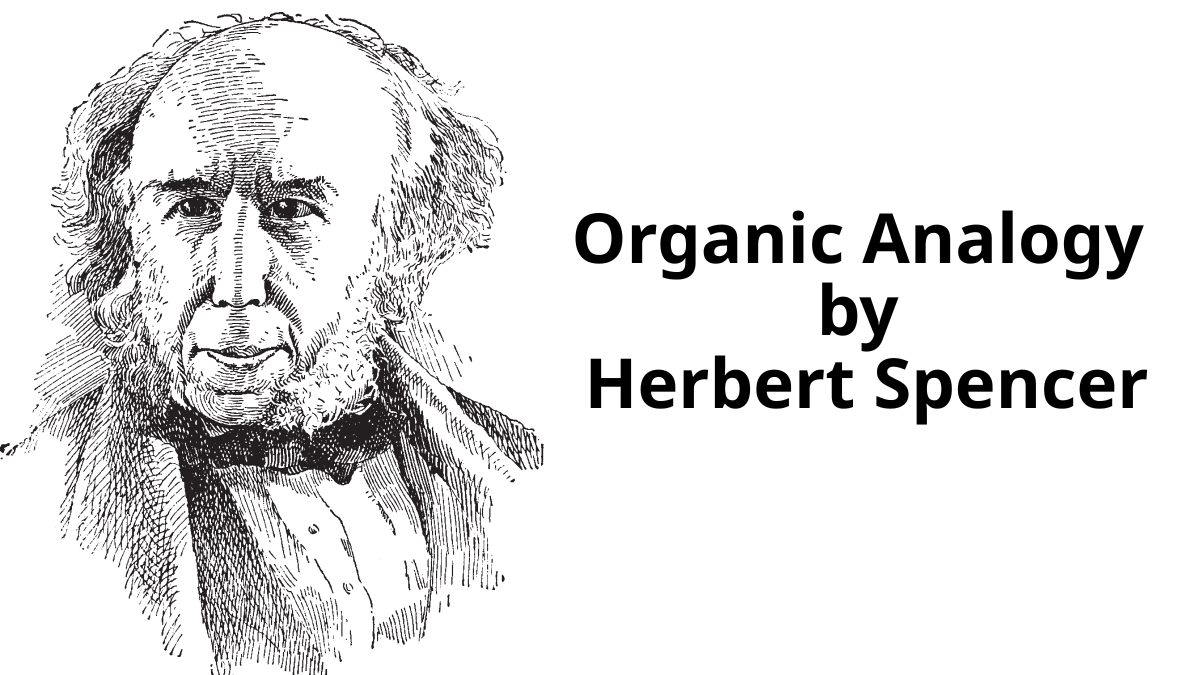Introduction
Herbert Spencer (1820–1903), a prominent British sociologist and philosopher, is widely recognized for his contributions to the development of sociological theory, particularly his application of biological concepts to the study of society. One of his most significant contributions is the Organic Analogy, where he compares society to a biological organism. This analogy became a foundational concept in early sociology, influencing structural-functionalism and shaping the way sociologists analyze social institutions.
This article explores Spencer’s Organic Analogy, its key features, implications, criticisms, and its relevance in contemporary sociology.
Understanding the Organic Analogy
Spencer’s Organic Analogy makes comparisons between a living thing and civilization. He maintained that society is made up of interrelated institutions that guarantee its stability and expansion, just like a biological organism is made up of interdependent pieces that cooperate to sustain its life.

Key Similarities Between Society and Organism
- Interdependence of Parts
- In an organism, organs (heart, lungs, brain) function interdependently to sustain life.
- In a similar thought, the government, the economy, the family, and religion all cooperate to uphold social order in society.
- Growth and Development
- Organisms grow from simple to complex forms (e.g., from a single cell to a multicellular organism).
- Societies evolve from simple tribal structures to complex industrial civilizations.
- Differentiation of Functions
- In biology, cells specialize into tissues and organs with specific roles.
- In society, labor becomes specialized (e.g., farmers, teachers, doctors) to enhance efficiency.
- Systemic Equilibrium
- Biological organisms maintain homeostasis (balance) to survive.
- Societies develop regulatory mechanisms (laws, norms) to ensure stability.
- Evolutionary Progress
- Using Darwin’s theory of evolution to discuss society, Spencer created the phrase “Social Darwinism.”
- He believed societies evolve through “survival of the fittest,” where stronger social structures replace weaker ones.
Spencer’s Evolutionary Theory of Society
Spencer’s Organic Analogy was part of his broader theory of social evolution. He classified societies into two types:
- Militant Societies
- Simple, centralized, and authoritarian (e.g., feudal systems).
- Characterized by compulsory cooperation and rigid hierarchies.
- Industrial Societies
- Complex, decentralized, and based on voluntary cooperation.
- Emphasize individualism, free markets, and contractual relationships.
Spencer believed that societies naturally progress from militant to industrial forms, driven by competition, adaptation, and specialization.

Implications of the Organic Analogy in Sociology
Spencer’s analogy influenced several sociological perspectives:
1. Structural-Functionalism
- Later theorists like Emile Durkheim and Talcott Parsons expanded on Spencer’s ideas.
- They saw society as a system in which institutions work to keep things stable.
2. Systems Theory
- Modern sociology uses systems theory to analyze how different social components interact.
- Spencer’s analogy laid the groundwork for understanding social equilibrium.
3. Social Darwinism (Controversial Aspect)
- Spencer’s belief in “survival of the fittest” was used to justify laissez-faire capitalism and colonialism.
- Critics argue it promotes inequality by suggesting that dominant groups are naturally superior.
Criticisms of the Organic Analogy
Despite its influence, Spencer’s analogy has faced significant criticism:
- Over-simplification of Society
- Societies are more complex than biological organisms; human behavior is shaped by culture, not just biology.
- Justification for Social Inequality
- Social Darwinism was misused to defend exploitation and racism.
- Lack of Attention to Conflict
- Spencer disregarded class conflict as a catalyst for social development, in contrast to Marx.
- Teleological Assumption
- Spencer assumed societies naturally progress toward complexity, which is not always true (e.g., societal collapse).
Relevance in Contemporary Sociology
While some aspects of Spencer’s theory are outdated, his ideas remain influential:
- Functionalism still uses systems-based analysis.
- Evolutionary sociology examines how societies adapt over time.
- Complexity theory in social sciences builds on his ideas of differentiation and interdependence.
However, modern sociology emphasizes human agency, conflict, and cultural factors, moving beyond strict biological analogies.
Conclusion
Herbert Spencer’s Organic Analogy was a groundbreaking concept that likened society to a living organism, emphasizing interdependence, evolution, and functional specialization. While his ideas contributed to structural-functionalism and systems theory, they also faced criticism for promoting Social Darwinism and oversimplifying social dynamics.

Despite its limitations, the Organic Analogy remains a crucial part of sociological history, offering valuable insights into how societies function and evolve. Contemporary sociology has refined these concepts, integrating them with more nuanced theories of conflict, culture, and human agency.
Do you like this this Article ? You Can follow as on :-
Facebook – https://www.facebook.com/hubsociology
Whatsapp Channel – https://whatsapp.com/channel/0029Vb6D8vGKWEKpJpu5QP0O
Gmail – hubsociology@gmail.com
Topic related question
5-Mark Questions (Short Answer Type)
- Define Herbert Spencer’s Organic Analogy.
- How does Spencer compare society to a biological organism?
- What is the significance of “differentiation of functions” in Spencer’s Organic Analogy?
- Name the two types of societies according to Spencer’s evolutionary theory.
- How did Spencer apply Darwin’s theory to sociology?
- What is the main criticism of Spencer’s Organic Analogy?
- How does the concept of “interdependence” apply in Spencer’s analogy?
- What is Social Darwinism? How is it related to Spencer?
- How did Spencer’s ideas influence structural-functionalism?
- Why is Spencer’s analogy considered deterministic?
10-Mark Questions (Brief Essay Type)
- Explain Herbert Spencer’s Organic Analogy with suitable examples.
- Discuss the similarities between society and a biological organism as per Spencer.
- Compare and contrast militant and industrial societies in Spencer’s evolutionary theory.
- Critically evaluate the strengths and weaknesses of Spencer’s Organic Analogy.
- How did Spencer’s theory contribute to the development of functionalism in sociology?
- Examine the role of “survival of the fittest” in Spencer’s sociological thought.
- Why is Spencer’s Organic Analogy considered controversial in modern sociology?
- Discuss the impact of Social Darwinism on 19th-century sociological thought.
- How does Spencer’s theory differ from Karl Marx’s conflict perspective?
- Assess the relevance of Spencer’s Organic Analogy in contemporary sociology.
15-Mark Questions (Long Essay Type)
- Critically analyze Herbert Spencer’s Organic Analogy and its influence on sociological theory.
- “Society is like a living organism.” Discuss this statement in light of Spencer’s Organic Analogy.
- Compare Spencer’s evolutionary theory of society with Durkheim’s functionalist approach.
- How did Spencer’s ideas shape early sociological thought, and what are their limitations?
- Evaluate the impact of Social Darwinism on political and economic ideologies in the 19th century.
- Discuss the contributions and criticisms of Herbert Spencer’s Organic Analogy in understanding social structure.
- To what extent can Spencer’s theory be applied to modern industrial societies?
- Examine the relationship between Spencer’s Organic Analogy and systems theory in sociology.
- How did Herbert Spencer’s views on society differ from those of Auguste Comte?
- “Spencer’s analogy oversimplifies social complexity.” Discuss with arguments for and against.
